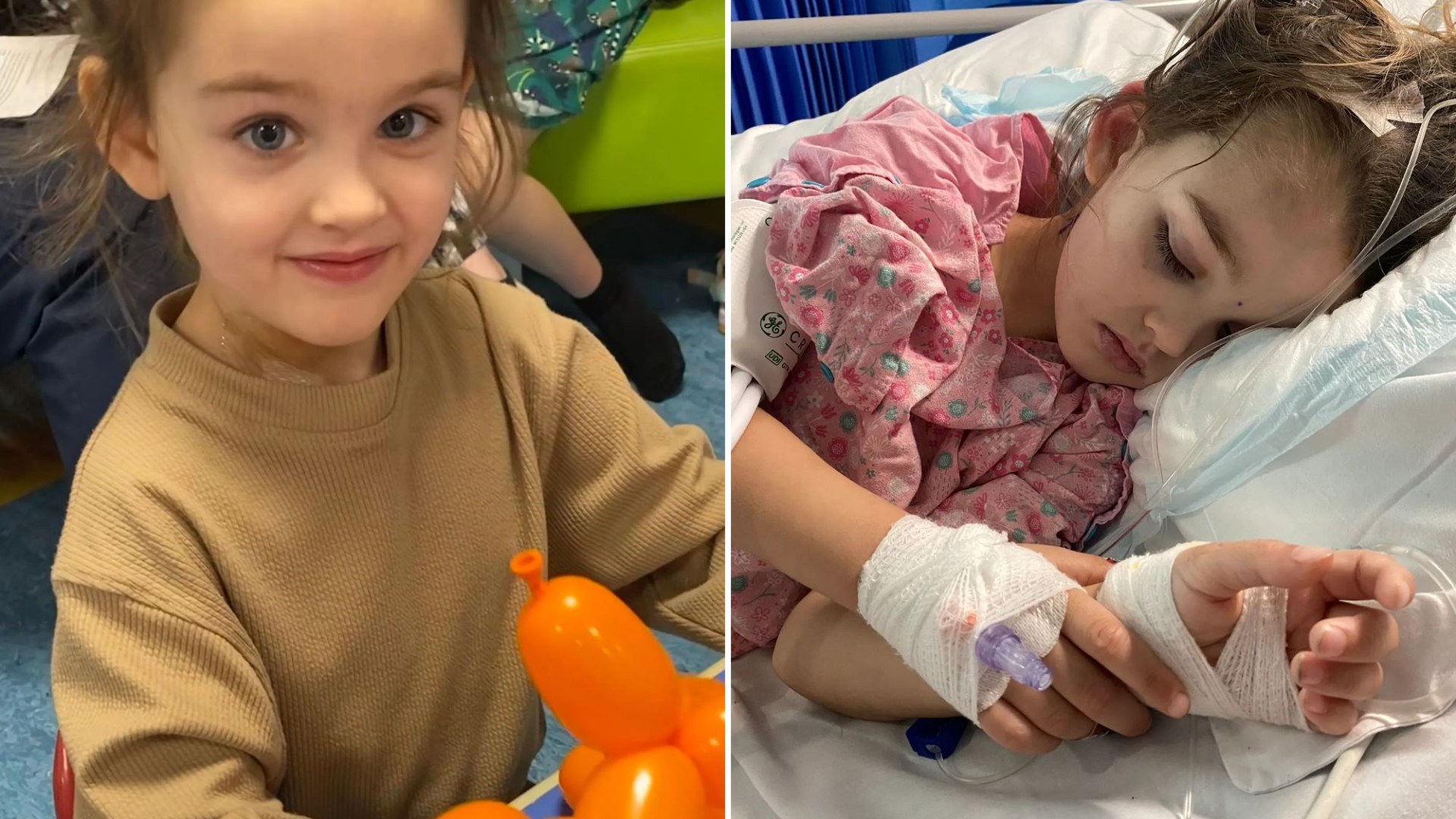WHEN Olivia, 5, became sick, her mum assumed it was due to the weather, never imagining she was in fact living with cancer.
Holly Brown, 31, a single stay-at-home mum from Clacton-on-Sea, Essex, now hopes to make “precious Christmas memories”, with an uncertain future ahead.
6

6

6
Olivia was diagnosed with a grade 3 medulloblastoma, the most common and aggressive form of a brain tumour in children, that later spread to her spine.
Around 52 children are diagnosed with medulloblastoma each year in the UK, according to Cancer Research UK.
Holly faced the devastating choice between Olivia having chemotherapy, offering a 30 per cent survival rate, or combining it with radiotherapy for a 50 per cent chance – but with risks of future learning difficulties.
She decided to go with the latter, hoping for positive updated test results on December 4.
Holly, also mum to Lilly, 12, Mason, seven, and Sonny, three, says: “Most of the time I just try and hold it together, because you’ve got no choice, really, you just have to get on with it.
“I can’t fall apart because my kids rely on me to be the strong one.
“There are moments where I sit and think about everything and go off and have a secret cry but I’m just doing what I’ve got to do for Olivia.”
Holly, who is fundraising, adds: “I want Christmas to be extra special for all of the children this year.”
Holly initially thought Olivia was suffering from heat stroke in May 2024 after she began vomiting in the hot weather.
By June, Olivia was being sick every day and was feeling extremely tired.
So on June 17, Holly took her to A&E, where doctors also noticed Olivia was “wobbly on her feet” and her eyes were “quite squinty”, with one appearing “lopsided”.
Olivia was admitted overnight for further tests, as brain tumour symptoms include weakness on one side of the body and vision problems.
On June 18, an MRI sadly revealed Olivia had a brain tumour.
Sobbing, Holly said: “I burst out crying, I was just devastated.”
That same day, Olivia underwent emergency surgery to fit an external ventricular drainage system to relieve a blockage preventing her spinal fluid from draining.
On June 21, Olivia had an eight-hour operation to remove 95 per cent of the tumour, but the remaining five per cent was too close to the brain to remove without causing damage.
Doctors said chemo and radiotherapy could lower her IQ and she would most likely end up with learning difficulties, it was such an impossible decision to make.
Holly
A week later, doctors informed Holly that Olivia had grade 3 medulloblastoma which often originates in embryonic tissue and is typically diagnosed within the first five years of life, according to Brain Tumour Research.
They also unfortunately informed her that the cancer had spread to her spine.
Holly cried: “I was just so worried, I didn’t know what was going to happen.
“I didn’t know if she would survive.”
Holly, who has been a stay-at-home mum for several years, struggled to explain the situation to her three other children.
“It was heartbreaking, telling them the news,” she said.
“I think my eldest is probably taking it the hardest, because she understands a lot more than the others, so she can be quite withdrawn, but I’ve just been trying my hardest to reassure her and let her know she can talk to me.”
Gruelling treatment
Holly chose a treatment plan for Olivia combining chemotherapy and radiotherapy, which although had a better survival rate, came with the risk of future learning difficulties.
Holly explained: “We had to think about her quality of life.
“[Doctors] said chemo and radiotherapy could lower her IQ and she would most likely end up with learning difficulties, it was such an impossible decision to make.”
Throughout this period, Holly found it difficult to know what to say to Olivia about her condition.
“Olivia gets quite upset at times, which is understandable with everything she’s been through,” Holly added.
“She does get a little bit scared when she has to do things but overall, she’s taken it quite well.
“I tell her as much as I can do, age appropriately, in a way that she’ll understand.
“I don’t go into too much detail, but I told her, she’s got cancer, and she’s got to have some treatments to make her better, and it will take quite a while, that’s all I can do, really.”
In August, Olivia underwent two five-day rounds of chemotherapy, during which she lost her hair.

6

6

6
“She took it quite well, really, we got given a children’s book by the hospital that explains chemotherapy, I think that helped with easing her mind,” Holly says.
“She was a little bit upset about what happened, but when it happened, I think probably because she’s young, she doesn’t really mind too much.
“I collected her hair, I kept it. I think maybe that helped and I’ve told her that it will grow back.”
Between the two rounds, doctors told Holly that the brain tumour had shrunk, but its exact size and the status of cancer in her spine remained unclear due to fluid buildup.
The hardest part is not knowing, it feels like everything is up in the air with it
Holly
In September, Olivia had six weeks of proton beam therapy, a type of radiotherapy that uses high-energy protons to treat cancer, as part of a clinical trial.
After radiotherapy, Olivia suffered from sore, flaky skin, and had extreme nausea and sickness – as a result, she had to be tube-fed for several weeks.
Olivia’s medical team has scheduled another scan for December 4 to reassess the tumour and will begin six to nine months of further chemotherapy on December 9.
Until then, the family are uncertain about what lies ahead.
Holly said: “The hardest part is not knowing, it feels like everything is up in the air with it.”
Holly and her mother, Amanda, set up a GoFundMe to transform Holly’s home into a Santa’s Grotto for December.
“We don’t really know how well she’s going to be because she’ll be having chemo in December, so it’s not a good idea to try and take her out anywhere,” Holly explained.
“So we just wanted to kind of make it the best we can at home – just fill the house with decorations, make it sort of like a Santa’s grotto.
“We want some precious Christmas memories.”
To donate for Olivia’s Christmas grotto go to www.gofundme.com/f/give-olivia-and-her-siblings-the-best-christmas.
The most common symptoms of a brain tumour

More than 12,000 Brits are diagnosed with a primary brain tumour every year — of which around half are cancerous — with 5,300 losing their lives.
The disease is the most deadly cancer in children and adults aged under 40, according to the Brain Tumour Charity.
Brain tumours reduce life expectancies by an average of 27 years, with just 12 per cent of adults surviving five years after diagnosis.
There are two main types, with non-cancerous benign tumours growing more slowly and being less likely to return after treatment.
Cancerous malignant brain tumours can either start in the brain or spread there from elsewhere in the body and are more likely to return.
Brain tumours can cause headaches, seizures, nausea, vomiting and memory problems, according to the NHS.
They can also lead to changes in personality weakness or paralysis on one side of the problem and problems with speech or vision.
The nine most common symptoms are:
- Headaches
- Seizures
- Feeling sick
- Being sick
- Memory problems
- Change in personality
- Weakness or paralysis on one side of the body
- Vision problems
- Speech problems
If you are suffering any of these symptoms, particularly a headache that feels different from the ones you normally get, you should visit your GP.
Source: NHS




